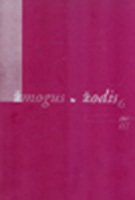Zum Ausdruck der Ursache durch Kasusformen im Litauischen, Russischen und Deutschen
Expression of Cause by Forms of Cases in Lithuanian, Russian and German
Author(s): Skaidra GirdenienėSubject(s): Language and Literature Studies
Published by: Vytauto Didžiojo Universitetas
Keywords: Kausalität; Kasus; adverbialer Kasusgebrauch; valenzbedingter Kasusgebrauch; Instrumental; Genitiv; Synonymie; Bedeutungssynkretismus.
Summary/Abstract: In the article expression of cause by forms of modifying cases in Lithuanian, Russian and German is analysed. Cases meaning the cause are Lithuanian and Russian instrumental and German genitive. In the historical part of the article usage of semantic causal case in old languages is overlooked, attention is drawn at its universality and frequency. According to the examples of investigated languages in the synchronic part of the article it is shown that now expression of cause by cases is limited and unproductive. In current German there is no more possibility to express the cause by a free case, though during the Germanic and a little later period instrumental has been used for that and in middle Upper German – genitive. Lithuanian and Russian languages have kept the causal instrumental, though this form is not that universal as it used to be in the early periods of the language. In both languages only expression of concrete cause and its subspecies is possible. The conclusion is drawn that primary forms of expression of cause – cases – have been replaced by prepositions, concretizing the meaning of cause.
Journal: Žmogus ir žodis
- Issue Year: 06/2004
- Issue No: 3
- Page Range: 8-14
- Page Count: 7
- Language: German

